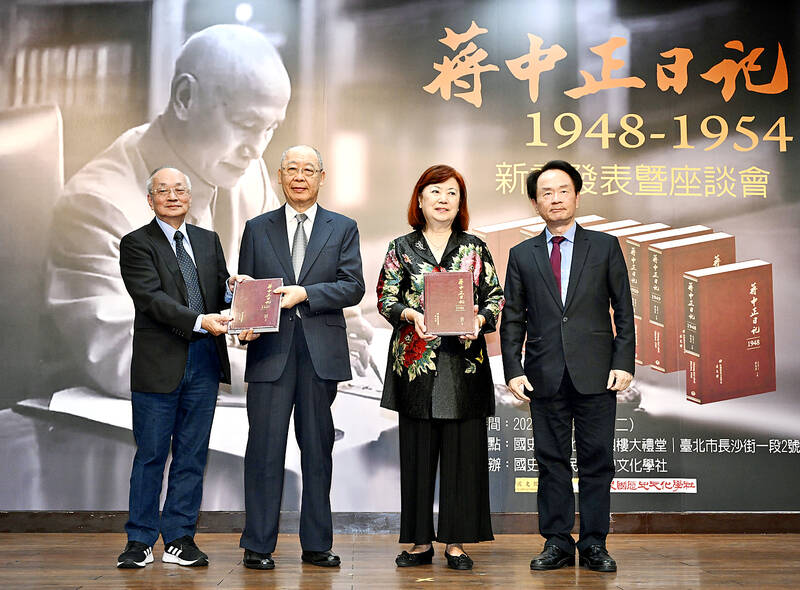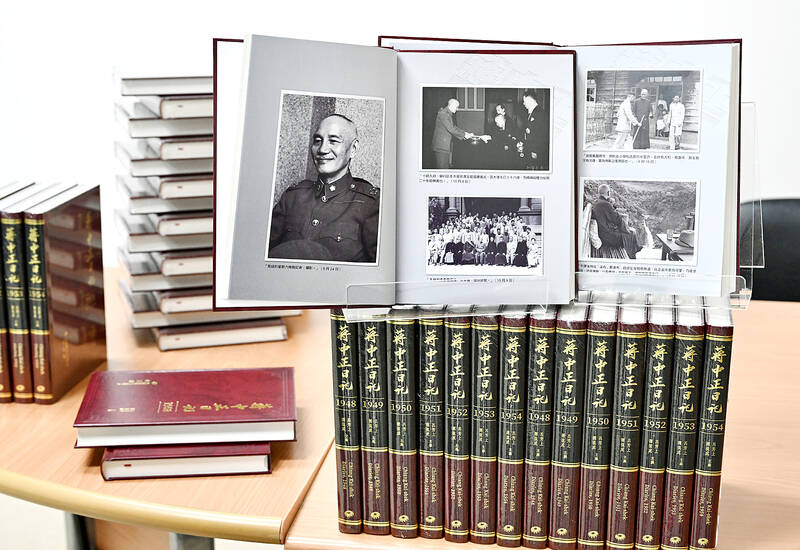The publication of former president Chiang Kai-shek’s (蔣介石) diaries, which were recently returned to Taiwan following a decade-long legal battle, is a form of “social reconciliation and progress,” Academia Historica said yesterday.
The seven-volume collection from 1948 to 1954, published by the Republic of China History and Culture Society, covers Chiang’s first term as president and the pivotal period during which he retreated to Taiwan after losing the Chinese Civil War.
More diaries covering Chiang’s later years in office are to be published from next year, the National Archives Administration said, adding that it plans to publish the 1970-1979 diaries of his son, former president Chiang Ching-kuo (蔣經國), later this year.

Photo: Lo Pei-de, Taipei Times
The content is to be uploaded to the state archives’ online database from March next year.
Academia Historica President Chen Yi-shen (陳儀深) told a news conference in Taipei that the publication of the diaries of Chiang Kai-shek — who remains a highly controversial figure in Taiwan — should be seen as “a form of social reconciliation and progress.”
Citing his own experience, Chen encouraged readers to avoid seeing Chiang Kai-shek in black-and-white terms, and instead read the diaries carefully within the historical context.

Photo: Lo Pei-de, Taipei Times
“Without a doubt, the diaries are important historical documents and cultural treasures,” Zhongzheng Cultural and Education Foundation president Chiang Fang Chih-yi (蔣方智怡) said in a speech at an event marking the occasion.
She pointed to the details recorded in the diaries that Chiang Kai-shek had kept over a span of about 50 years.
Chiang Fang — who was married to Chiang Ching-kuo’s third son, Chiang Hsiao-yung (蔣孝勇) — signed an agreement with Stanford University’s Hoover Institution to keep the diaries for 50 years starting from 2005.
Academia Historica in 2013 said she had signed an agreement with it to take over the documents, leading to a protracted legal battle that culminated with the return of the diaries in September, when Academia Historica received 59 boxes of documents kept by the former presidents from 1917 to 1979.
Chiang Fang said that people who are critical of Chiang Kai-shek should consider the circumstances he faced as leader of the Republic of China, such as fighting Japan, while also combating communists.
The achievements Taiwan enjoys today should be considered when analyzing the endeavors of those who came before, she added.
Chiang Fang concluded by referring to a statement from Chiang Kai-shek’s will, encouraging Taiwanese to “revive democratic culture and safeguard democracy.”
One of the collection’s most notable passages is Chiang Kai-shek’s description of leaving Chengdu — the last Nationalist-controlled city in China — on Dec. 10, 1949. He left the city after learning that then-Yunnan Province governor Lu Han (盧漢) had defected to the communists and asked the leader of the then-Hsikang Province (a region now part of Sichuan Province) to help capture Chiang Kai-shek.
After holding meetings that morning, Chiang Kai-shek boarded a 2pm flight at Chengdu’s Fenghuangshan military airport and arrived in Taipei that evening, where he was taken directly to the Grass Mountain Chateau on Yangmingshan.
Perhaps unexpectedly given the circumstances, Chiang’s diary entry for that day praises the “mild air” and “peaceful environment” in Taiwan, which he compared with the “gloom” that had settled over wartime Chengdu.

The Central Election Commission has amended election and recall regulations to require elected office candidates to provide proof that they have no Chinese citizenship, a Cabinet report said. The commission on Oct. 29 last year revised the Measures for the Permission of Family-based Residence, Long-term Residence and Settlement of People from the Mainland Area in the Taiwan Area (大陸地區人民在台灣地區依親居留長期居留或定居許可辦法), the Executive Yuan said in a report it submitted to the legislature for review. The revision requires Chinese citizens applying for permanent residency to submit notarial documents showing that they have lost their Chinese household record and have renounced — or have never

A magnitude 5.6 earthquake struck off the coast of Yilan County at 12:37pm today, with clear shaking felt across much of northern Taiwan. There were no immediate reports of damage. The epicenter of the quake was 16.9km east-southeast of Yilan County Hall offshore at a depth of 66.8km, Central Weather Administration (CWA) data showed. The maximum intensity registered at a 4 in Yilan County’s Nanao Township (南澳) on Taiwan’s seven-tier scale. Other parts of Yilan, as well as certain areas of Hualien County, Taipei, New Taipei City, Taoyuan, Hsinchu County, Taichung and Miaoli County, recorded intensities of 3. Residents of Yilan County and Taipei received

Taiwan has secured another breakthrough in fruit exports, with jujubes, dragon fruit and lychees approved for shipment to the EU, the Ministry of Agriculture said yesterday. The Animal and Plant Health Inspection Agency on Thursday received formal notification of the approval from the EU, the ministry said, adding that the decision was expected to expand Taiwanese fruit producers’ access to high-end European markets. Taiwan exported 126 tonnes of lychees last year, valued at US$1.48 million, with Japan accounting for 102 tonnes. Other export destinations included New Zealand, Hong Kong, the US and Australia, ministry data showed. Jujube exports totaled 103 tonnes, valued at

BIG SPENDERS: Foreign investors bought the most Taiwan equities since 2005, signaling confidence that an AI boom would continue to benefit chipmakers Taiwan Semiconductor Manufacturing Co’s (TSMC, 台積電) market capitalization swelled to US$2 trillion for the first time following a 4.25 percent rally in its American depositary receipts (ADR) overnight, putting the world’s biggest contract chipmaker sixth on the list of the world’s biggest companies by market capitalization, just behind Amazon.com Inc. The site CompaniesMarketcap.com ranked TSMC ahead of Saudi Aramco and Meta Platforms Inc. The Taiwanese company’s ADRs on Tuesday surged to US$385.75 on the New York Stock Exchange, as strong demand for artificial intelligence (AI) applications led to chip supply constraints and boost revenue growth to record-breaking levels. Each TSMC ADR represents